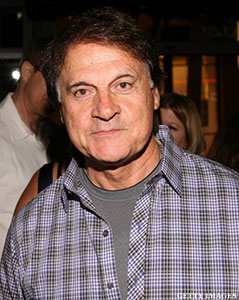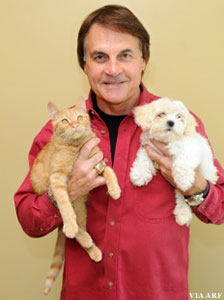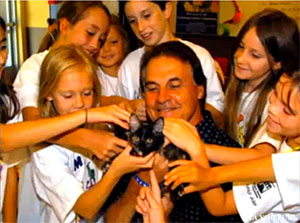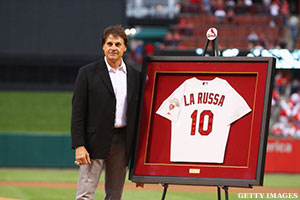
Personal investment had always been a staple of Tony La Russa's baseball philosophy. But in 2011, in what was to be the last of his 33 years as a manager, consistently living up to his own expectations had become increasingly difficult.
Managing not only his team but the game itself had always come naturally for La Russa. Before 2011 he had been the mastermind behind two World Series championships and five league championship series appearances.
And yet, for three or four years, La Russa had found difficulty in concentrating the way he once did. It made him wonder if he could continue to set the standard for his players when he was struggling on a day-to-day basis to pour himself into the game he had devoted 50 years to.
La Russa asked himself how he, in good faith, could ask players to follow his leadership when, deep down, he was wrestling with just how much more he could give?
The more the questions arose, the deeper he delved deeper into himself.

"Where it starts is with personalizing yourself," La Russa told ThePostGame in a phone interview. "I can't ask players to do things I wouldn't do myself."
Maybe he needed a change.
Perhaps, after all the wins, all the championship seasons, his priorities needed to shift. After all, for La Russa -- the third all-time winningest manager in MLB history -- personal involvement has always gone well beyond baseball.
It has extended to the communities.
Those places became more than just the cities where he happened to work and more than just teams that he managed. For 33 years, Chicago, Oakland and St. Louis became engrained in who he was, making it seem only right that La Russa put a piece of himself into the baseball stops that became home.
Which brings us to the cat.
By 1990, his fifth season with the A's, La Russa had come to know every square inch of the Oakland Coliseum. He knew the spots where balls tended to carom off the wall or the spots in the infield where routine grounders turned into base hits thanks to a fortuitous bounce.
And he knew about the cats.

The felines congregated under the seats, feeding off scraps left by fans from the night before. Occasionally, they'd find their way onto the field during battling practice, testing their courage.
So on that night against the Yankees when a calico darted out of a hole in the wall near the New York bullpen, La Russa wasn't shocked. But what happened next helped to lead La Russa down a philanthropic and charitable path he hadn't necessarily seen coming.
The cat darted to centerfield, only to be spooked by outfielder Roberto Kelly. Sensing danger, the cat changed course, ran to the right field corner, turned right and past the Yankees dugout. From there, it dashed behind the plate before running out of gas near the A's dugout.
La Russa used his foot to divert the cat, which disappeared into the dugout and into a nearby bathroom. La Russa closed the door, prepared to move on with the game -- and his life as he knew it.

After the game, county animal control officials came to pick up the cat, a fact La Russa passed onto his wife, Elaine, who had seen the incident on television and phoned her husband to inquire about the cat's whereabouts.
Knowing that the Alameda County animal shelter was likely over-populated, Elaine passed on some disturbing news to La Russa.
"If the cat stays there," she said. "They're going to kill it."
The next day, La Russa phoned the shelter, informing animal control officials he intended to drive the 25 miles from his home in Contra Costa County and take the cat to a shelter there, where it could be saved and put up for adoption.
Now, 21 years later, La Russa's Animal Rescue Foundation (ARF) has helped raise awareness around the nation, traveling to shelters to help provide a safe haven for a large number of pets that are brought into county facilities around the country on the daily basis.
"To go to most county shelters, there's an over-population problem that's staggering," La Russa says. "As soon as (shelters) reach their limit, they have to euthanize thousands and thousands of adoptable animals."
Since establishing ARF in 1991, La Russa devoted as much time as he could to raising awareness of animal rescue. But given the time constraints he faced during the seasons he managed the A's and Cardinals, he discovered he couldn't spend as much time working with his foundation as he liked.
But after guiding the Cardinals to a World Series championship in 2011, La Russa retired and spent the past season working to help build a $17 million, 38,000-square-foot facility in Walnut Creek, Calif.

The center includes a 23,000-square-foot animal rescue shelter, where animals are put up for adoption. But it also includes 15,000 square feet for classroom space and a learning center, where groups such as special-needs kids or senior citizens can visit and learn how much companionship pets can bring once they become part of someone's family.
This month, ARF reached the milestone of having its 25,000th animal adopted. Rumpelstiltskin, an 11-week-old kitten, was adopted after a local animal shelter surrendered it to ARF when the kitten was only a few weeks old.
Last year, ARF placed 1,974 pets in homes, a giant leap from the foundation's first year when it saw 157 animals adopted. But, according to ARF executive director Elena Bicker, the foundation's mission is a daily battle to save animals, rescuing them from shelters that euthanize 40,000 pets every year.
ARF has a no-kill policy, meaning that 100 percent of the animals the organization takes in are adopted. And Bicker says La Russa has been there every step for ARF in the past 21 years in a very personal way.
La Russa keeps an office at the foundation's headquarters, often working nights and weekends to care for the animals that arrive on a daily basis.

"You put a puppy or kitten in his lap and he just becomes a huge marshmallow," says Bicker, who has been with ARF since 1993, starting as a volunteer for five years. "A lot of people have seen him in the dugout with that intense, fierce face -- the drive to win –- and that transfers over to the motivation and energy into the rescue work.
"But I don't know that man in the dugout with the sunglasses. The guy who shows up for work at ARF always has a smile on his face."
La Russa grew up without a pet because his mother had been traumatized by a shot she was required to get after being scratched by a stray cat. It wasn't until La Russa married Elaine, who owned a cat and a poodle, that he discovered what pets can do for humans on a daily basis.
"Within two days, I realized that in all my dreams of having a pet, I had underestimated how wonderful it was to have that companion," La Russa said.
Now, he works to make sure others can experience the love for animals he has developed during the past 39 years.
In addition to the dogs and cats that are brought in, La Russa's foundation also travels around the area collecting pets from facilities that can't house as many animals and that often are forced to euthanize them within 24 hours of when they are brought in.
It's a cause that will take center stage next week in Las Vegas when La Russa's foundation will host its inaugural Leaders and Legends event at the MGM Grand. For four days, a collection of former athletes –- including football Hall of Famers Jim Brown and Gale Sayers and baseball Hall of Famers Reggie Jackson and Dennis Eckersley –- former coaches and business executives will come together to raise awareness and money for animal rescue efforts.
The event is one La Russa says has been years in the making, offering a chance for his friends to gather and not only celebrate the work ARF has done but look at the challenges still ahead.
La Russa says a large portion of the proceeds will go toward not only continuing ARF has done since 1991, but also expanding a Pets for Vets program that pairs soldiers, often facing uncertainty, returning from Iraq and Afghanistan with companionship and comfort.
For La Russa, it's just another way to invest of himself.
Throughout his managerial career, giving back to community became a key message La Russa passed down to his players. It didn't matter where they devoted their time and energy to or for what cause, La Russa encouraged his players to expand the personal investment they made to their careers to something much greater.
"He sets a hell of an example," says Eckersley, a Hall of Fame and American League MVP and Cy Young winner with the A's in 1992, when he had 51 saves. "But when you see Tony's involvement (with ARF), it's more than the average charity -- this is a passion that runs through his veins.
"It's everything to him. It's right next to baseball. It's a close second."
Over time, he's seen more of a willingness for athletes to do so, following an example La Russa was taught to appreciate by White Sox owner Jerry Reinsdorf and former A's owner Walter Haas.

"I can think back to years ago when the players were much more into themselves," La Russa said. "It was like nothing else existed except for their fame, their fortune and their families. But I think that's something that has changed over the past 10-12 years and you start to see guys get involved with things.
"And it doesn't matter what it is, once one guy is involved, everyone becomes involved."
But by being the one who set the example, players who followed La Russa's lead soon came to see a different side of him -- the side that many who work along side with him at ARF see on a regular basis.
And for players like Eckersley, getting the chance to see a different side of the stoic manager made all the difference in the world.
"They're not the same guy," says Eckersley, who finished his 24-year career with 390 saves. "When you know that about Tony, that's when you know the true guy, the true man. But I feel closer to him because I've seen the level of his commitment and his passion and the caring side of him.
"The other guy was my boss. This guy was the real man."
The day-to-day involvement with his players is a relationship La Russa has missed in the year he's been away from baseball. Although he spent the past season working on a part-time basis for the commissioner's office, La Russa has started to see the game through a different lens.

That brings us back to the 2011 season when the Cardinals erased a 10½-game deficit to make a magical run to the World Series.
As much as La Russa had been struggling to maintain the high level of concentration needed to remain one of baseball's elite managers, leading St. Louis through a September when he said the Cardinals were "up against a cliff where with one more nudge, we'd go over the edge" nine or 10 times, La Russa and the Cardinals found a way to persevere.
"If you're in a pennant race like we were last year, that's just a natural high," says La Russa, who spent six months this year working on the book, One Last Strike chronicling his final season. "You wake up in the morning and you've got a chance to play in October. So the more we made the comeback, the more excited all of us became.
"I rarely thought about retiring when we were in the middle of it because we were so excited and so full of just trying to win the next game."
La Russa points to a pivotal three-game series against Atlanta -- which had held a 10 ½ game lead in the wild card standings on Aug. 24 -- as the turning point.
Trailing by two runs in the ninth inning of the series' first game, St. Louis used two walks and Albert Pujols' two-run single to tie it before winning in the 10th on Nick Punto's sacrifice fly.

The three-game sweep of the Braves catapulted the Cardinals into the playoffs -- beginning a run that La Russa described to his players and coaches last year as historic.
"The history had to do with where we were at the end of August," former hitting coach Mark McGwire said in a 2011 interview with ESPN.com. "He kept talking about the history of coming back from 10½ games out, and how that had never been done before. … But it doesn't become history unless you finish it off."
After knocking off National League favorite Philadelphia in the divisional series and beating Milwaukee in the NLCS, the Cardinals clinched their 14th National League pennant.
The magical season extended to the World Series, where twice, in Game 6 against Texas, the Cardinals were down to their final strike. And although La Russa had told his family, a few select coaches and his owner he was leaning toward retiring, he kept it from his players.
He finally broke the news to his team after a team rally in St. Louis, gathering his players in a gymnasium with an announcement that came as a shock to a team that had endured so much to claim another championship -- La Russa's third as a manger.
"I really felt like I was raining on their parade," La Russa said. "But I still pinch myself to think that the last year was a year when there was so many unbelievable games and there were so many athletic heroic moments and to actually have a ring to show for it, it's just hard to believe it really happened."
La Russa is pondering his future and expects to return to baseball in a front-office capacity. He has fielded a few phone calls and had a few meetings in a season when he said he hasn't once regretted retiring after winning a World Series title.
He spent spring training working as a volunteer assistant with the Tigers, rekindling relationships with Detroit manager Jim Leyland and general manager Dave Dombrowski. Although his role with the commissioner's office has given him a new perspective on baseball -- making him see it as more of a global industry rather than a game he played during his 132-game playing career that was split between the minor leagues and big leagues, La Russa isn't ready to give up on his personal investment with the game.
How or when he'll return to baseball on a full-time basis hasn't been determined as La Russa said he just wants to make the right move. And although his role will change, the passion that has always fueled him never will.
"I know that when you're around guys in the (front) office, they live and die with it the same way you do -- the difference is, they're one step removed," La Russa said.
"But for 50 years -- first when I played and then when I managed -- you'd every day you'd wake up and every night there's a game and there's that competition and I do miss that investment in winning and losing."
-- Email Jeff Arnold at jeff.arnold@thepostgame.com and follow him on Twitter @jeff_arnold24.









